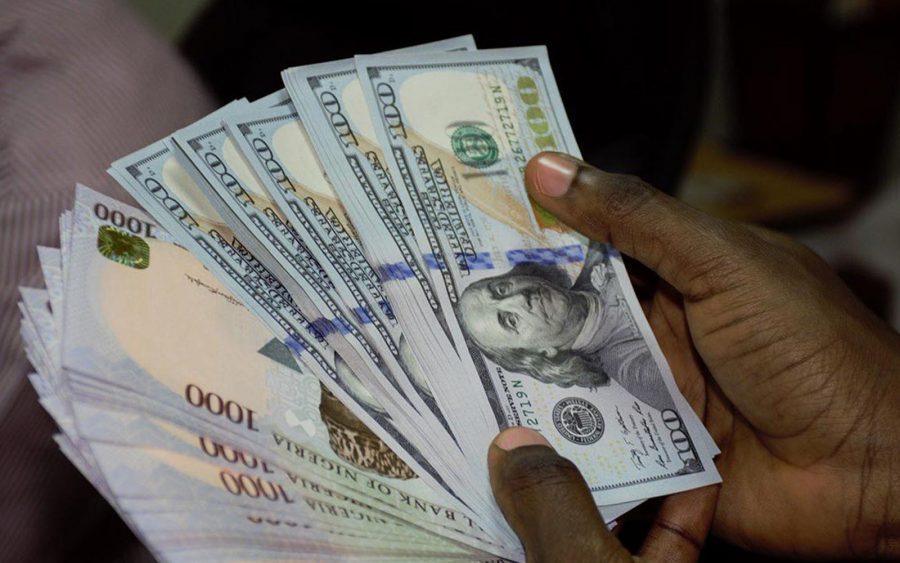The Central Bank of Nigeria (CBN)stabilized the Naira in 2018 by injecting $39.9 billion into the foreign exchange market (Forex). This is according to the CBN Q4 2018 economic report.
In the last quarter of 2018, the CBN sustained its interventions at both the inter-bank and Bureau de change (BDC). The Central Bank’s $US39.9billion intervention in 2018 represents an 87% increase year-on-year when compared to US$21.36 billion in 2017.
Despite the apex bank’s intervention, the interbank exchange rate (₦/$) stood at an average of ₦306.70/US$, the relative level it was at the end of September 2018.
Basic Highlights
- At the inter-bank segment, average exchange rate naira vis-à-vis the US dollar depreciated by 0.2%.
- At the BDC segment, the average exchange rate depreciated by 0.9%. This represents 0.01% below the levels in the preceding quarter of 2018, and the corresponding period of 2017 to N362.42/US$.
- At the Investors and Exporters (I&E) window segment, the average exchange rate stood at N364.27/US$, representing 0.5 % and 1.0% depreciation relative to the levels in the preceding quarter and the corresponding period of 2017, respectively.
- A total of US$9.18 billion was sold by the CBN to authorised dealers in Q4 of 2018. This represented 16.1% decline below the level in the Q3 of 2018 but was 80.6 per cent above the level in the corresponding period of 2017.
Break down of disbursements to authorised dealers in Q4 2018
- US$3.15 billion was foreign exchange forwards disbursed at maturity date, this represents 34.3% of the total amount.
- The sales to BDCs amounted to US$2.98 billion. This represents 32.5 per cent% total disbursement
- Also, at the I&E window, US$2.09 billion was sold. This represents 22.8% of the total amount disbursed.
- On interbank sales, forex disbursement was US$0.82 billion (8.7%)
- The premium between the average inter-bank and BDC rates widened by 0.8% points in the review quarter, from 18.2% points at the end of Q4 2018.
- The spread between the average exchange rates at the Investors’ and Exporters’ window and the BDC segment narrowed further to 0.5%, from 0.9% at the end of the preceding quarter
- The sum of US$0.13 billion was disbursed to Swaps transactions. That is 1.5% per cent fo total forex disbursement to authorised dealers in Q4 of 2018.
Growth Rate of Forex Supply in the fourth quarter of 2018
- The total Forex Supply to BDC and rDAS reduced by 62% in Q4 2018. US$2.16 billion was supplied in Q3 as against US$0.82 in Q4 2018.
- Also, the supply of Swaps dropped by 89.4% in Q4 2018. Supply of Swaps stood at US$0.13 billion in Q$, a fall compared to US$1.23 billion in Q3 for the year under review.
- Supply to BDC increased in Q4 of 2018 to US$2.98, as against US$2.41 in Q3. This is a US$0.57 increase supply of forex to BDC in Q4 of 2018.
- Foreign exchange Forwards on the other hand from in Q4 to US$3.15 as against US$3.24 in Q3
- Total forex supplied to both BDC and rDAS dropped from US$11.88 in Q3 to US$9.18 in Q4 2018.
Why CBN Intervention?
The Apex bank of a country whose currency is enduring extreme upward or downward financial pressure intervenes in either buying or selling of currencies. This is done to stabilise the currency market situation. Essentially, such a market situation is usually caused by high volatility from a surge of trading by speculators and market players.
The intervention is sometimes used to boost or decrease a currency value, most commonly for the purpose of boosting and decreasing productivity and exports of a nation.
Economic Agents in various sectors require forex for the various cross-border transactions and investment. Hence, the Apex bank periodically intervenes in the foreign exchange market to aid investors and businesses in the economy.
Like firms, individuals equally make transactions which cut across medical trips, tuition and other basic travel allowances Hence, the high demands of forex without corresponding forex supply can trigger currency exchange rates to jack up.
Similarly, speculations in the forex market can result in an artificial scarcity of forex supply, which will have multiplier effects on businesses and individuals.
It can, however, turn problematic for a nation to use market intervention whenever the currency value does decline steeply in the foreign exchange market. One key disadvantage of regular intervention is that export-dependent countries could spiral into recession if they become too reliant on market intervention.
Stabilising Naira
The CBN intervention in recent years is attributable to a sharp or sudden decline in the value of a currency due to decline in prices of the country’s major export. The supply is expected to have multiplier effects across key sectors of the economy in the immediate run.
According to the CBN Director, Corporate Communications, Isaac Okorafor,
“CBN had made commendable effort in keeping the exchange rates at the current levels.”
“The CBN is determined to sustain a stable exchange rate as it continues to put in place relevant measures to shore up the country’s reserves,” Okorafor said in a statement”.
In order to stabilize the forex market, the Apex injected a total of $US39.9 billion in 2018, majorly, the relative stability of the exchange rate of the country in Q4 of 2018 is traceable to the periodic intervention by the CBN. In the short run, this is good for the economy as demand for forex by the market players are at least contained.
